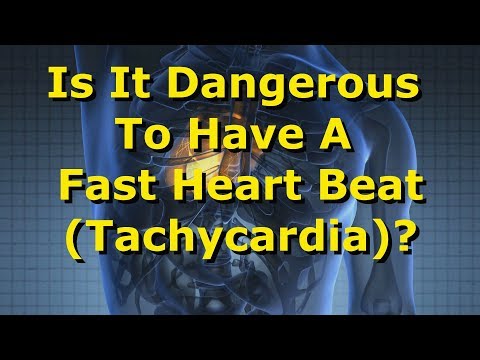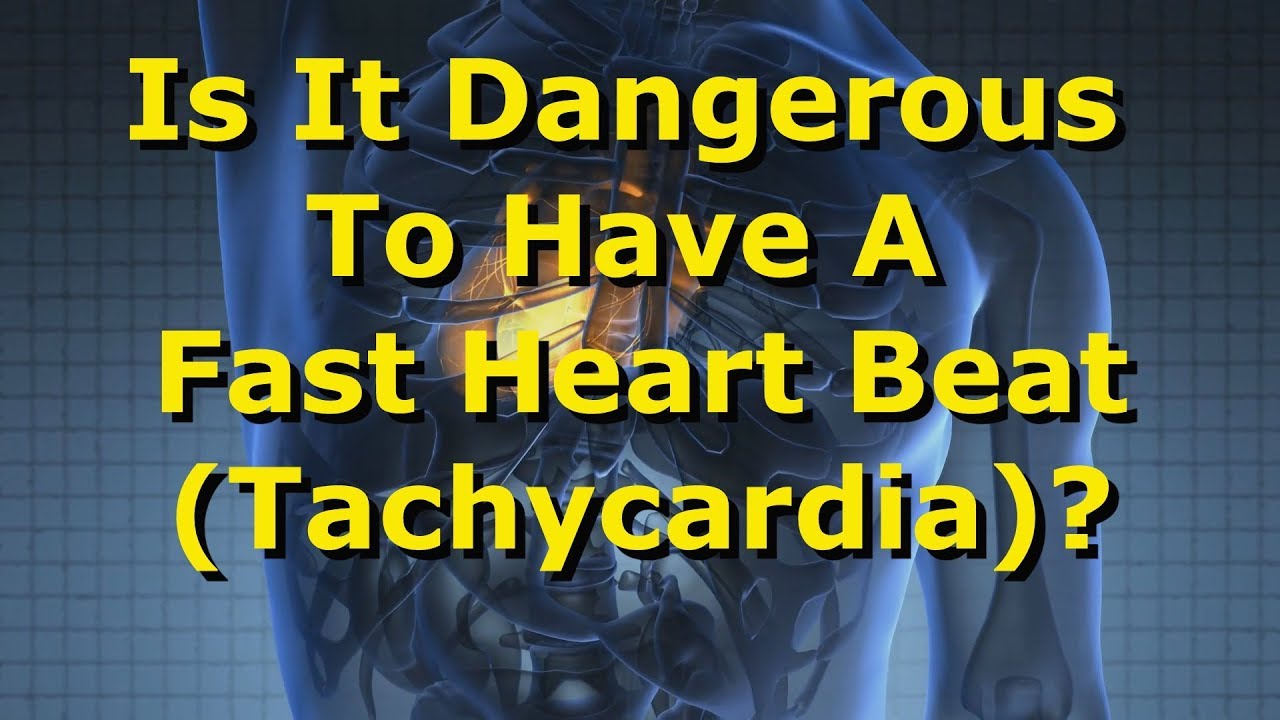What happens when your heart beats too fast is a captivating exploration into the intricate workings of our cardiovascular system. This intriguing article delves deep into the physiological repercussions of an accelerated heart rate, shedding light on the potential dangers and fascinating mechanisms behind this phenomenon. As you immerse yourself in this comprehensive piece, you will unravel the intricate interplay between the heart and the rest of the body, gaining a newfound appreciation for the delicacy of our biological rhythms.
Discover how an excessively rapid heartbeat can trigger a cascade of events, affecting not only the heart but also various organs and bodily functions. Explore the remarkable adaptations the body makes to compensate for this increased demand, attempting to maintain equilibrium amidst the chaos. Dive into the intriguing world of heart rate regulation and uncover the myriad factors that contribute to heartbeat irregularities.
Uncover the potential causes behind an accelerated heart rate, ranging from stress and anxiety to underlying medical conditions. Gain insights into the alarming symptoms that may accompany a racing heart, such as shortness of breath, dizziness, and chest pain. Delve into the fascinating mechanisms that underlie these symptoms, providing a deeper understanding of the body’s response to heightened cardiovascular activity.
Ultimately, this captivating article will leave you with a newfound appreciation for the intricacies of our cardiovascular system, highlighting the importance of maintaining a healthy heart rate for overall well-being.

Effects of Tachycardia: When Your Heart Beats Too Fast
| Effect | Description |
|---|---|
| Decreased Cardiac Output | Tachycardia, defined as a heart rate exceeding 100 beats per minute, can result in decreased cardiac output. With the heart beating too fast, the ventricles have less time to fill with blood during diastole, leading to reduced stroke volume and subsequently decreased blood flow to the organs. |
| Increased Oxygen Demand | As the heart beats faster, it requires more oxygen to sustain its increased workload. This can pose a challenge, especially in individuals with underlying cardiovascular conditions or compromised respiratory function. The increased oxygen demand can potentially lead to myocardial ischemia, angina, or even myocardial infarction. |
| Arrhythmias | Tachycardia can precipitate various arrhythmias, disrupting the normal electrical conduction of the heart. These arrhythmias can include atrial fibrillation, supraventricular tachycardia, or ventricular tachycardia. Prolonged or severe tachycardia can even trigger life-threatening ventricular fibrillation, necessitating immediate medical intervention. |
| Heart Failure | Chronic tachycardia can lead to heart failure, particularly in individuals with pre-existing cardiac conditions. The continuous strain on the heart weakens the cardiac muscles over time, impairing its ability to pump blood efficiently. This can result in symptoms such as shortness of breath, fatigue, and fluid retention. |
| Dizziness and Syncope | Tachycardia can cause inadequate blood supply to the brain, triggering dizziness and syncope (fainting). The reduced cerebral perfusion pressure resulting from the rapid heart rate can lead to temporary loss of consciousness, posing risks for falls and injuries. |
Note: It’s important to consult with a healthcare professional for accurate diagnosis and appropriate management if experiencing symptoms related to tachycardia.
“The Racing Heart: Unveiling the Perils of Tachycardia”
What Happens When Your Heart Beats Too Fast
Our heart is a vital organ that plays a crucial role in pumping blood throughout our body. It beats at a specific rate to ensure that oxygen and nutrients are delivered efficiently to all our organs and tissues. However, there are times when our heart may start beating too fast, a condition known as tachycardia. In this article, we will explore what happens when your heart beats too fast and the potential consequences it can have on your health.
Increased Heart Rate
Tachycardia is defined as a heart rate that exceeds the normal resting rate, which is typically between 60 to 100 beats per minute. When your heart beats too fast, it can reach rates of 100 to 400 beats per minute, or even higher in severe cases. This rapid increase in heart rate can lead to a range of symptoms and physiological changes.
The most common symptoms of a fast heart rate include palpitations, chest pain, shortness of breath, dizziness, and lightheadedness. Some individuals may also experience fatigue, fainting, or even loss of consciousness. It is important to note that the severity of these symptoms can vary depending on the underlying cause of the tachycardia.
Decreased Cardiac Output
Cardiac output refers to the amount of blood pumped by the heart per minute. When the heart beats too fast, it has less time to fill with blood between contractions. As a result, the amount of blood pumped out of the heart per beat, known as stroke volume, decreases. This reduction in stroke volume leads to a decrease in cardiac output.
A decreased cardiac output can have significant implications for the body. It means that less oxygen and nutrients are being delivered to the organs and tissues, which can result in fatigue, weakness, and reduced exercise tolerance. In severe cases, it can even lead to organ damage if left untreated.
Electrolyte Imbalance
An electrolyte imbalance can contribute to the development of tachycardia. Electrolytes are minerals in our body that help maintain proper fluid balance and facilitate nerve and muscle function. Imbalances in electrolyte levels, such as low levels of potassium or magnesium, can disrupt the electrical signals that regulate heart rhythm.
When the electrical signals in the heart are disrupted, it can cause the heart to beat too fast. This is particularly common in individuals who have certain medical conditions or take medications that can alter electrolyte levels. Treating the underlying electrolyte imbalance is often crucial in managing tachycardia and restoring a normal heart rate.
Increased Risk of Blood Clots
When your heart beats too fast, the blood flow becomes turbulent and irregular. This can increase the risk of blood clots forming within the heart and its associated blood vessels. Blood clots can be dangerous as they can travel to other parts of the body, causing blockages and potentially leading to serious complications such as stroke or heart attack.
Individuals with certain types of tachycardia, such as atrial fibrillation, are particularly prone to blood clot formation. It is important for individuals with tachycardia to work closely with their healthcare provider to manage their condition and reduce the risk of blood clots through medication or other interventions.
Impact on Overall Health
When your heart beats too fast, it can have a significant impact on your overall health and well-being. The stress and strain placed on the heart can lead to the development of other cardiovascular conditions, such as heart failure or cardiomyopathy. Additionally, the symptoms associated with tachycardia can significantly reduce your quality of life and interfere with daily activities.
It is essential to seek medical attention if you experience a fast heart rate or any related symptoms. A healthcare professional can evaluate the underlying cause of your tachycardia and recommend appropriate treatment options to manage your condition and minimize its impact on your health.
Conclusion
When your heart beats too fast, it can have various consequences on your health and well-being. The increased heart rate, reduced cardiac output, electrolyte imbalances, increased risk of blood clots, and overall impact on your health are all important aspects to consider. If you experience a fast heart rate or related symptoms, it is crucial to consult a healthcare professional for proper evaluation and management.
Effects of a Fast Heartbeat:
- Palpitations or rapid and strong heartbeats
- Dizziness or lightheadedness
- Shortness of breath
- Chest pain or discomfort
- Fluttering or pounding sensation in the chest
- Fainting or loss of consciousness
- Increased sweating
- Fatigue or weakness
- Anxiety or restlessness
- Inability to exercise or perform physical activities

